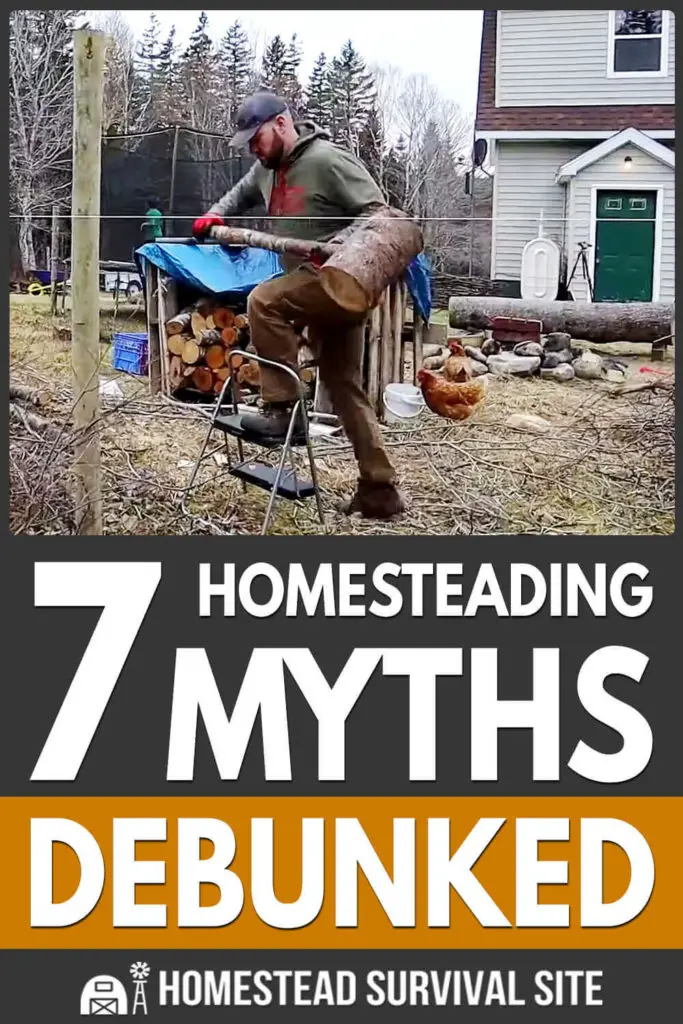Estimated reading time: 6 minutes
Are you considering a life on the homestead? When you're stuck in your cubicle after lunch, are dreams of goats and chickens clouding your mind? Maybe you would have taken the leap already if not for something terrible you heard about homesteading.
In this article, we are going to look at 7 homesteading myths that aren’t true at all.
Want to save this post for later? Click Here to Pin It On Pinterest!
1. You Have To Be Completely Off Grid
Freedom is probably the best thing about homesteading. You have to keep that in mind at all times. As a homesteader, you have the freedom to choose your own destiny. There are no homesteading police who check on what you're doing to make sure it meets certain criteria.
Your homestead can be partially on the grid, partially powered, or even completely free of electricity altogether. The solar and wind harvesting technologies are getting better all the time and that gives you options. Of course, that doesn’t mean you need any power on your homestead. It just makes things a lot easier when you have a little juice, in my opinion.
2. You Must Grow All Your Own Food
Another wild myth about homesteaders is that they must all be 100% self-sufficient. This idea that all their food must come from the homestead is another fallacy. I mean, what happens if you want a big ole lobster drenched in butter? What if your homestead is in Arkansas?
I do think that homesteaders are more aware of food sources than most people. If you are living by the homesteading credo, it stands to reason that your food sourcing choices are going to be very strict and particular.
Homesteaders may grow and raise a large portion of their food, but don’t forget that bartering with neighbors is another big part of living on a homestead. This barter is proof that goodies come from places outside of the homestead.
3. Homesteaders Never Use Antibiotics For Their Animals
The overuse of antibiotics and the cramped conditions that factory farming has employed created a stigma against antibiotic use in food. Suddenly, this idea that antibiotics have no place on a farm has taken root. I would like to clear the air here and ask one simple question: What is the quickest way out of a bacterial infection?
Want to start a homestead but not sure how?
Click Here to get a FREE book, "How To Homestead No Matter Where You Live."
Animals get sick and they feel bad. If they are living in a pasture and getting the food sources their body needs, they will still get sick. I have pampered chickens who live in the lap of luxury, but guess what? Sometimes they get sick!
A responsible owner will have a good relationship with a responsible vet for their livestock, and when an antibiotic can get them better, it should be administered. That is very different from the antibiotic inoculation that happens when animals are forced to live in stalls standing in their own feces.
To better understand responsible antibiotic use on livestock, get to know the folks at AnimalAntibiotics.org/
4. You Must Have Farming Experience To Be A Homesteader
Families all over the nation have been rushing into homesteads and tiny houses to get away from the hustle and bustle of American city life. Times are changing. If you think everyone from a metro city who made the jump studied agriculture in college, you are very wrong.
The truth is, most of the people who fled metro areas for a new life on the homestead had zero experience. And despite that, many of them have had tremendous success. By reading books, watching videos, and learning from their neighbors, they have developed skills that allow them to earn extra income and live incredible lives.
Many of them have gone on to start their own Youtube Channels. For example: Starry Hilder, Guildbrook Farm, Big Family Homestead, and Fouch Family Off Grid,
5. Homesteading Is A Relaxing Endeavor
At first, my heart went out to the couple who decided to sell their home and buy a homestead… for retirement. They arrived on the scene to find that there was nothing but back-breaking work ahead of them, from now until the end.
I am not sure how they made this mistake without knowing it was going to take a tremendous amount of work to keep a homestead afloat. After a while, I began to understand that the homestead will keep them alive and well for a long time.
This prospect of getting up and having a purpose each day is as important to the old as it is to the young. When you get older, purpose can be harder to find. Physical activity also becomes much more important. In the end, the old couple was blessed by their homestead.
6. You Must Be A Prepper To Be A Homesteader
The paths sometimes intersect, there is no getting around that. Oftentimes, preppers slowly but surely turn into homesteaders. Being a prepper is much more about a journey than a bunker.
On the inverse, the homesteader’s goals might have nothing to do with prepping for the end of the world. Their goals could be as benign as a better quality of life or access to a clean environment and better food.
Want to start a homestead but not sure how?
Click Here to get a FREE book, "How To Homestead No Matter Where You Live."
Again, being a homesteader is about having the freedom to do as you wish. It has very little to do with being a prepper. As a homesteader, you would probably cringe at things like high powered rifles and purchasing freeze-dried foods.
7. There Is No Money In Homesteading
Could there be a better life than successfully homesteading and making money at the same time? Although it's true that in the beginning, starting your homestead can be very expensive, over time it can become profitable. In fact, there are dozens of ways to make money homesteading.
Homesteaders have a wealth of resources. They have food, animals, land, knowledge, and experience. There is money to be made in each one of these categories. In fact, each of these is a business in its own right.
Homesteaders can squeeze plenty of money out of all the different things they do. The idea that there is no money in homesteading has got to be one of the biggest myths around!
Recap
I hope you now have a better feel for what it is to be a homesteader. Assumptions can be dangerous, and myths like these could cut someone off from their true calling. Can you think of other homesteading myths that need debunking? Leave them in the comments below.
Like this post? Don't Forget to Pin It On Pinterest!



All excellent points ??
1. I’ve always planed a back up power source for my future homestead. A generator running the freezers brings peace of mind as does an operating wood stove for heat.
2. I can see growing all your own food as a goal BUT I still can’t grow parsley to save my life, the learning curve must be tackled. I’m also imagining that your area & growing season are a big factor, until season extension structures can be built.
3. Thank you, YES! Not using antibiotics on an ill animal is cruel.
4. Willingness to learn is a key.
5. It can be relaxing if you plan ? I think setting realistic goals & expectations of the work involved is important.
6. I’m already a pepper so the homestead is the next step. Having a meal prepared or easily assembled saves a lot of stress after a full day of work.
7. With social media these days, having a product you can put out ‘there’ that people see value in can be very profitable but producing it in a reliable way is very important from veggies to meat products.
Excellent post! Thank you ?
This was a wonderful post, thank you. We are one of those retired and then bought a farm couples. I am 63 and cannot imagine not working at something at my age. I feel like I am 18 and hope that this will keep me going.
All your points are so true and so well explained.
Thanks again.
Sonia